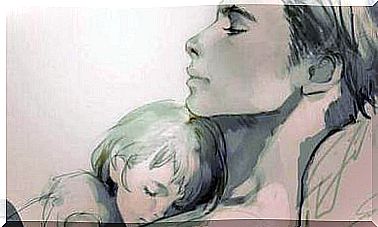How Can I Know If I Have Overcome The Period Of Grief?

Despite what we may think, it is not always easy to know if we have overcome the period of grief. The psychological reaction to the loss we have experienced may still be unfinished, and may behave like an inflamed wound, by filling our lives with obstacles and limitations. It is therefore necessary to be able to recognize the clues that may show that grief has not been taken care of.
We understand grief as any event that frees us from something or someone that is important to us. It could be the loss of a loved one, an emotional breakup with your partner, or losing a job. It may even be leaving a certain role that identified us and made us feel happy. Such an event means, above all, the sudden absence of a kind of bond, the extinction of something that meant a lot to us.
When it comes to the best way to deal with the period of grief, there is no universal strategy. Each person reacts differently, and this is the most difficult. We can therefore not recommend a number of “normal” techniques for dealing with grief that can help us all. The simple reason is that there is nothing as private, messy and chaotic as the pain caused by loss.
However, there is something we can not deny: the strength of a person’s resilience is enormous. Although we can never completely heal the emptiness left by the loss, we will be able to live with it. We can even allow ourselves to be happy again. But we must face and deal effectively with our own personal grief.

Signs that you have not overcome the period of grief
One strange thing is that there is so much private, almost invisible, grief in our society. This is sometimes “unauthorized” grief where the painful loss is not always recognized. An example of this is the mothers who lose their babies during pregnancy. This traumatic event affects many women who undoubtedly need specialized support that can often be inadequate in hospitals.
In the same way , children are also part of this group that is not always understood. There are many children who live out their grief in silence. They do so in an environment that still believes that, due to their age, they still do not understand what death means. In addition to this, it should be noted that there are also men who suffer from this “unauthorized” grief for a very specific reason.
In many countries, the ideal man continues to represent the rational and protective role in which he is expected not to express his emotional pain openly. Often, this perception hinders the process of rebuilding after experiencing a loss. And sometimes to the point where we develop chronic states of helplessness that we need to understand and, of course, cope with.
Let us look at the symptoms that may indicate that one has not overcome the period of grief.

We still can not talk about the person we have lost
In every period of sorrow, a decisive moment must come. That is the moment when we finally open up. That’s when we need to talk to someone about our loss. About the person or situation we have left behind. Talking, expressing, remembering and bringing certain memories to the surface can soothe and comfort us. It also favors emotional relief.
If several months and years have passed and we still cannot talk about the person we lost, it means that we are not quite done with the grief yet. If we perceive a blocking wall, a lump in the throat and a resistance to remembering the person or situation, we must ask for professional help.
Facts that trigger excessive emotional reactions
The person can apparently lead a normal life. But in their daily lives, emotional reactions that no one else understands can suddenly appear. The triggering cause can be an object, a specific piece of music, a specific situation. All of these can act as a trigger for memory.
When the door to the past suddenly opens, unexplained pain, caused by the loss, suddenly comes to the surface. Where the emptiness left by the loss emerges as an open wound.
Constant changes in lifestyle
Another obvious fact that shows that we have not overcome the period of grief is the constant need to make changes. Some people fail to keep the same job for two months in a row. Friendships, hobbies and interests change. Nothing satisfies or relieves us, and we find that we find everything boring. It is usually this constant search for new things that makes us forget reality.

Mood swings
Some people go through periods of euphoria and times of isolation and great apathy. This is simply more proof that they have not recovered from the loss they have experienced. They fluctuate between needing other people around them, at times when they need solitude and personal reflection. All of these are obvious traces of a hidden grief that totally undermines the quality of life.
In many of these cases, it is common for the person to end up with subclinical depression. This is a disorder that does not meet the criteria for a diagnosis of clinical depression, or even a mild depression, yet the emotional exhaustion is present in a very real way.
When we know that we have overcome the period of grief
So far we have seen all these hidden symptoms that seem to indicate that we are still carrying with us the loss we experienced. It foresees our life, limits it, and leaves us trapped in a state of chronic suffering. Many of these symptoms cause some form of mental illness. Disorders that further reduce our motivation to move on and to be happy again.
We must understand that we must allow sufficient time for our brain to adapt to a reality that has changed abruptly and even in an unfair way. And because of this, during this transition period that can last for months and years, the environment, our attitude and the medical professionals around us, will be able to help us deal with all the special grief problems.

Proof of recovery
Some things that show that we have overcome the period of grief are:
- We can talk about the person we have lost in a normal way. We allow ourselves to release our emotions and even cry, but we do so with acceptance.
- Gradually, we are able to place plans on the horizon, and look forward to new goals.
- We make a place for that person inside us. Far from leaving them, we have them as a valuable resource that is integrated into our reality, but without being dependent on them. We remember them with love and joy, but without letting the pain block us.
- We open up to our surroundings. We say yes to meeting new people, to expanding our relationships, and to letting positive emotions embrace us without feeling guilty or making our conscience feel bad. The happiness we allow ourselves to experience can be a good tribute to the people we lose, but who live in our hearts as a security.









